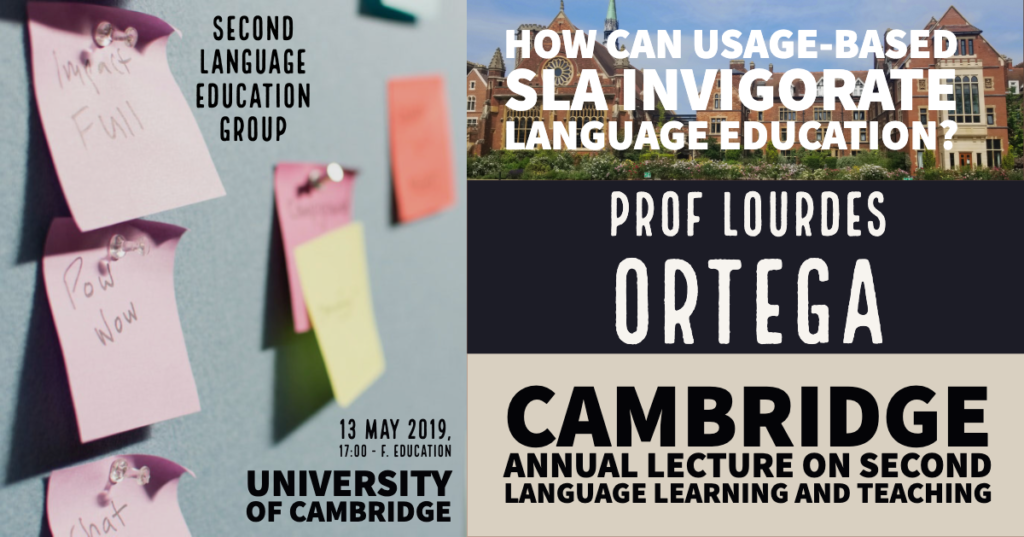How can usage-based SLA invigorate language education?

Prof. Lourdes Ortega, Georgetown University
F. Education, University of Cambridge, 17:00-18:30
SLEG Cambridge talks: URL
Some ideas discussed in the talk
A multilingual under a multilingual perspective:
not necessarily from birth
mot mativelike
not even equally proficient in different L2s
It is in usage that we find explanations
Self-referenced development, no monolingual educated nativeness
Usage based are sources of inspitation for SL instruction
-Fequency & statistical learning, skewed input (Madlener, 2018) & exemplars
-Meaning at the center
-Embodiment & multimodality essential
Empirical studies that adopt usage-based perspectives document how, in child learners (Ambridge & Lieven, 2015) as well as in adult learners (Cadierno & Eskildsen, 2015), grammar emerges piece-meal from general psychological principles of statistical learning, abstraction, and categorization that are massively, redundantly, and compulsorily engaged during iterative social communication events. Moreover, the events, the statistics, and the categorization are specific to each person’s history of language experience (Ochs, 2012), driven by socially distributed meaning and grounded in the material world, that is, multimodal and embodied (Kiefer & Pullvermüller, 2012). In this talk, I examine a broad palette of applications that have infused these usage-based insights into language teaching. Some see effective language teaching as capitalizing on fundamentally implicit, statistical and input driven processes (Verspoor, 2017). Some agree but also envision a larger role for explicit instruction of grammar as providing top-down short-cuts that strengthen cognitive processes of abstraction and categorization, particularly if the explicit content is informed by cognitive linguistic descriptions and appeals to meaning (Tyler, 2012; Tyler & Ortega, 2018). A role for largely explicit pedagogies is envisioned by others (Zhang & Lantolf, 2015), hoping for instructional designs that can create “artificial” routes of explicit self-regulation into language development. Others (Wagner, 2015) have also called for instruction that orchestrates opportunities for contextualized social interactions “in the wild” with explicit reflections of one’s emergent usage history in the classroom. Yet, others have emphasized the need to put the complexities of learner-and-language at the center of instruction (Larsen-Freeman, 2015; Roehr-Brackin, 2014). In reviewing and evaluating these trends, I will distill theoretical principles that might open up a new kind of usage-inspired language pedagogy for the future, one that will challenge, update, and invigorate language education in the foreseeable future.
Lourdes Ortega is a Professor in the Department of Linguistics at Georgetown University. She is best known for an award-winning meta-analysis of second language instruction published in 2000, a best-seller graduate-level textbook Understanding Second Language Acquisition (Routledge 2009, translated into Mandarin in 2016), and since 2010 for championing a bilingual and social justice turn in her field of second language acquisition. Her latest book is The Handbook of Bilingualism with Cambridge University Press (co-edited in 2019 with child bilingualism researcher Annick De Houwer).